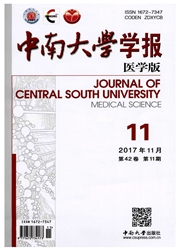

 中文摘要:
中文摘要:
目的:探讨健康中国汉族人群中basigin(BSG)基因的单核苷酸多态性(single nucleotide polymorphisms,SNPs)发生情况。方法:随机收集48例健康、无亲缘关系的中国汉族人外周血液并提取基因组DNA,设计引物对所有个体BSG基因的启动子区、外显子区和外显子内含子交界区的序列进行PCR扩增和正反向测序,通过判读测序峰图,明确SNPs的发生情况及其频率;通过Hardy-Weinberg平衡分析、单倍型推测和连锁不平衡分析,确定BSG基因位点的单倍型标~SNPs(haplotype tag SNPs,htSNPs);中性理论检验查明该基因位点SNPs频率分布是否符合选择中性。结果:共发现19个SNPs,其中包括2个新发现的SNPs;所有SNPs位点基因型分布均符合Hardy-Weinberg平衡。该基因位点共推测出4种常见单倍型域,确定9个SNPs为htSNPs。中性理论检验结果提示健康中国汉族人群BSG基因的SNPs分布符合中性进化假说。结论:首次对中国健康汉族人群BSG基因的SNPs进行了发掘,确定了其9个单倍型标签SNPs,为在汉族人群中研究该基因的遗传多态性与疾病易感性或药物反应性个体差异奠定了基础。
 英文摘要:
英文摘要:
Objective: To identify BSG single nucleotide polymorphisms (SNPs) in Chinese Han population. Methods: Peripheral blood samples were collected from 48 unrelated healthy Chinese Han subjects. Sequences at the BSG locus, including the promoter region, all exons and exon-intron boundaries were amplified, sequenced and followed by Hardy-Weinberg equilibrium test and linkage disequilibrium (LD) analysis. Results: A total of 19 SNPs were identified, 2 of which two were novel. Genotype distributions of all SNPs were consistent with Hardy-Weinberg equilibrium. Four haplotype blocks were constructed throughout the gene locus, and 9 haplotype tag SNPs (htSNPs) were inferred. Distribution of SNPs was in accordance with the neutrality theory in Chinese Han population. Conclusion: For the first time, systematic identification of BSG SNPs in the Chinese Han population has been done, and 9 htSNPs are identified. Our study has provided basis for further genetic association studies for related diseases as well as pharmacogenetics study for drug response in Chinese Han population.
 同期刊论文项目
同期刊论文项目
 同项目期刊论文
同项目期刊论文
 Induction of both P-glycoprotein and specific cytochrome P450 by aspirin eventually does not alter t
Induction of both P-glycoprotein and specific cytochrome P450 by aspirin eventually does not alter t Correlations of DDAH1 Transcript Variants with Human Endothelial Asymmetric Dimethylarginine Metabol
Correlations of DDAH1 Transcript Variants with Human Endothelial Asymmetric Dimethylarginine Metabol Response to Asymmetric Dimethylarginine and DDAH1 Transcript Variants in Cardiovascular and Cerebrov
Response to Asymmetric Dimethylarginine and DDAH1 Transcript Variants in Cardiovascular and Cerebrov Association of the AGXT2 V140I polymorphism with risk for coronary heart disease in a Chinese popula
Association of the AGXT2 V140I polymorphism with risk for coronary heart disease in a Chinese popula Association of platelet ITGA2B and ITGB3 polymorphisms with ex vivo antiplatelet effect of ticagrelo
Association of platelet ITGA2B and ITGB3 polymorphisms with ex vivo antiplatelet effect of ticagrelo Wilms Tumor 1 rs16754 predicts favorable clinical outcomes for acute myeloid leukemia patients in So
Wilms Tumor 1 rs16754 predicts favorable clinical outcomes for acute myeloid leukemia patients in So 期刊信息
期刊信息
